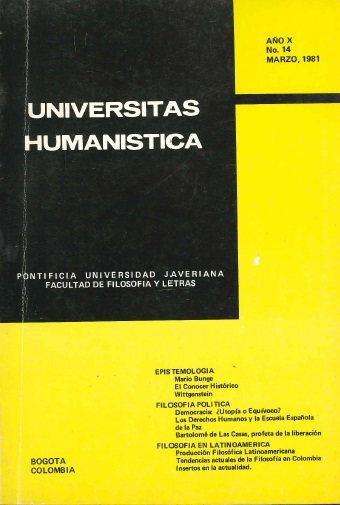Abstract
A partir de la década de los cincuenta la Fenomenología marca la reflexión filosófica en Colombia. Sin embargo, esta reflexión considera a la fenomenología como una filosofía idealista y trascendental. Recientes trabajos de filósofos colombianos pretenden superar esta interpretación parcial de la fenomenología y recuperar la intención metódica de la misma. En este trabajo la Teoría Crítica de la Sociedad de Habermas y la Hermenéutica de Gadamer y Ricoeur han sido definitivas. Examinar los vínculos entre las tres orientaciones filosóficas y sus consecuencias para nuestro quehacer reflexivo: tal es el objeto de este trabajo.

This journal provides immediate open access to its content on the principle that making research freely available to the public, encourages greater global exchange of knowledge.
The journal Universitas Humanística is registered under a Creative Commons Attribution 4.0 International Public License. Thus, this work may be reproduced, distributed, and publicly shared in digital format, as long as the names of the authors and Pontificia Universidad Javeriana are acknowledged. Others are allowed to quote, adapt, transform, auto-archive, republish, and create based on this material, for any purpose (even commercial ones), provided the authorship is duly acknowledged, a link to the original work is provided, and it is specified if changes have been made. Pontificia Universidad Javeriana does not hold the rights of published works and the authors are solely responsible for the contents of their works; they keep the moral, intellectual, privacy, and publicity rights.
Approving the intervention of the work (review, copy-editing, translation, layout) and the following outreach, are granted through an use license and not through an assignment of rights. This means the journal and Pontificia Universidad Javeriana cannot be held responsible for any ethical malpractice by the authors. As a consequence of the protection granted by the use license, the journal is not required to publish recantations or modify information already published, unless the errata stems from the editorial management process. Publishing contents in this journal does not generate royalties for contributors.


